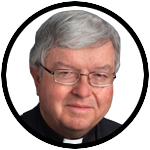
Father Kenneth Doyle
Q. A recent picture in a magazine showed Pope Francis signing a car that had been given to him. The cutline for the photo said that the pope had signed and blessed the car before putting it up for auction by Sotheby’s in London, with the proceeds going to charitable work.
But I had always understood that, according to church law, blessed articles cannot be sold. Would you comment, please? (Bloomington, Indiana)
A. What you saw in the magazine did, in fact, happen. In November 2017, the Italian automaker Lamborghini donated to Pope Francis a new model sports car in the Vatican colors of white and gold, worth upwards of $200,000.
The pope autographed and blessed the vehicle, which was then consigned to Sotheby’s to be auctioned off — the proceeds going to three charities close to the pope’s heart: the rebuilding of homes and Christian houses of worship in Iraq that had been destroyed by the Islamic State; assistance to women who had been victimized by prostitution and human trafficking; and specialized medical care in several African nations.
[hotblock]
It would be safe to assume that the pope would not violate canon law, and that is true here. Nowhere does the church prohibit the sale of each and every blessed object. Like most priests, I am regularly asked to bless new homes, and there are specific prayers created for such a purpose. But imagine how infrequently that would happen if such a blessing were to result in the permanent prohibition of that house’s resale!
What must not be sold are blessed objects of religious devotion — crucifixes, medals, rosaries, etc. Such objects are to be blessed only after they are purchased.
The Lamborghini company, I’m quite certain, never imagined that Pope Francis would put this donated vehicle to his personal use. That would have clashed with some specific guidance already offered by the pope. In July 2013, meeting with seminarians and novices, the pontiff cautioned them against cars that were “showy.”
“I tell you,” he said, “it truly grieves me to see a priest or a sister with the latest model.” “Choose a more humble car,” he told them, and “think of all the children who are dying of hunger.” (That sensitivity is reflected in the pope’s own choice for traveling around Rome — a 2008 Ford Focus.)
Q. I have heard and read that the Girl Scouts support Planned Parenthood. What is the church’s understanding of this? (New Lexington, Ohio)
A. In recent years, concerns have arisen about certain affiliations of the Girls Scouts of the United States of America (GSUSA) in reference to issues of church teaching. Those concerns relate especially to GSUSA’s link with the World Association of Girl Guides and Girl Scouts, to which GSUSA contributes more than $1 million each year — particularly with the association’s stated support of “sexual and reproductive health/rights.”
Based on such concerns, the U.S. Conference of Catholic Bishops undertook a study that resulted in its 2014 decision to leave it up to local bishops to determine whether their dioceses and parishes should affiliate with GSUSA.
Among other things, it was suggested that dioceses seek a memorandum of understanding with GSUSA that parishes troops are to be “free from any programming or activities contrary to the church’s teaching.”
During interviews done as part of the study, GSUSA stressed that it has no official relationship with Planned Parenthood. And during a 2014 Girl Scouts national convention, the federation’s executive director noted that “no monies collected by Girl Scouts for any purpose, including our girls’ cookie sales, will be given to Planned Parenthood or any other organization” that advocates on issues such as abortion and contraception.
However, GSUSA also noted that it has no authority to prohibit local councils or troops from forming their own relationships with such organizations. In May 2017, the Archdiocese of Kansas City, Kansas, chose to cut ties with GSUSA and to affiliate instead with a Christian program called the American Heritage Girls.
***
Questions may be sent to Father Kenneth Doyle at askfatherdoyle@gmail.com and 30 Columbia Circle Dr., Albany, New York 12203.
PREVIOUS: Ash Wednesday begins the journey of a lifetime
NEXT: Ash Wednesday can mark a rebirth of faith in lapsed Catholics



Share this story